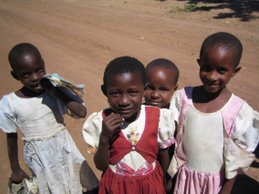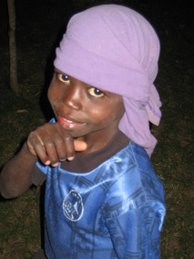Nyamata

On my way to the main bus station a little boy came up to me and asked me for something to eat, so I popped into the nearest shop and bought him some peanuts and chocolate milk. Within seconds about a dozen more streetkids appeared from nowhere and I had to go back and get food for them all - some of them wanted a picture taken so I snapped it quickly and kept walking before any more streetkids could arrive and I would have no money at all left!
The bus station was quite a bit further than I anticipated from the centre, but eventually I arrived (with a few new blisters). I quickly found the right bus thanks to some helpful strangers who thought a pregnant muzungu was one of the funniest sights ever, and climbed in ready to go. The minibus (same as a dalladalla for those that followed the Tanzanian adventures) didn't leave until it was full a good forty minutes later, but the trip to Nyamata was mostly smooth and took less than an hour passing gorgeous scenery along the way.
About half way there an old man got on the bus and says "How are you today young lady" quite loudly to me as he sat down. It's the first thing that anyone on the bus had said to me other than confirming it was the right bus, and everyone turned towards us to listen. He tells me he spent 33 years in Uganda so he has good English and starts chatting to me, asking what I think of Rwanda, and then talks mainly about the genocide and how difficult it is for people to learn to live together now, though they are trying very hard.
When we arrived in Nyamata the bloke next to me asked if I knew where I was going and offered to show me the way. As we walk along he tells me a bit about himself - he's 25 and studying at the university in Kigali. Next week he will defend his thesis and hopes to do well enough so that next year he can begin a Masters programme in Kampala at the big university there. He tells me he has family in the area so I asked if his brothers and sisters lived there.
He replies "No, they're all dead."
And then I said "and your parents...?"
"They are dead too. They were all killed in the genocide, there's only me and my aunt left."
The memorial used to be the church in Nyamata. When the president's plane crashed Tutsis from all around Nyamata gathered in the church thinking it would provide them with a refuge, instead they were slaughtered. 
He showed me the orphanage where he grew up behind the church and the schools he went to. I asked him how he felt about people coming to look at the memorials from overseas and he told me it made him really happy that people were learning from it so it wouldn't happen again.
...sadly, it is happening right now in Darfur.










No comments:
Post a Comment